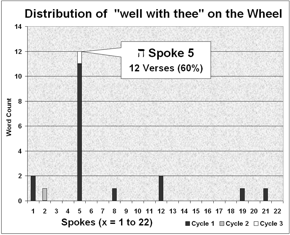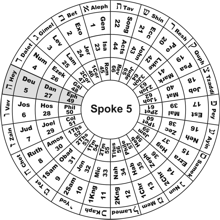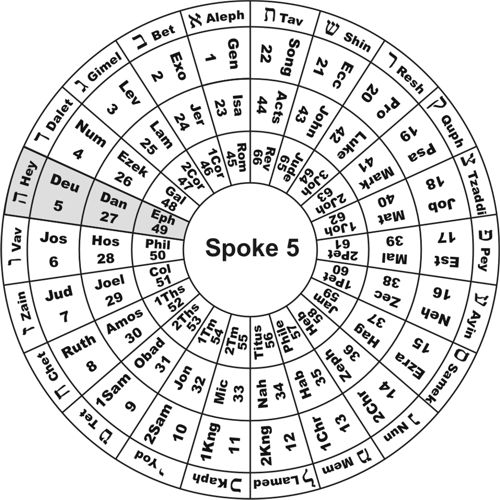Deuteronomy: That it may go well with thee
Know therefore this day, and consider it in thine heart, that the LORD he is God in heaven above, and upon the earth beneath: there is none else.
Thou shalt keep therefore his statutes, and his commandments, which I command thee this day, that it may go well with thee, and with thy children after thee, and that thou mayest prolong thy days upon the earth, which the LORD thy God giveth thee, for ever.
Deuteronomy 4:39ff (Spoke 5, Cycle 1)
The traditional Christian name of the Fifth Book, Deuteronomy, means second (deutero) law (nomos).
It got this name because it contains a second record of the Ten Commandments. In all essentials, the
lists given in Exodus 20 and Deuteronomy 5 are identical, but there are some seemingly slight variations
that open the door to a world of insight into the Divine design of the Wheel. Of particular interest for Spoke 5
is the addition of the phrase "that it may go well with thee" in the Fifth Commandment as given in the Fifth Book:
| The Two Versions of the Fifth Commandment
|
| Exodus 20:12 (Book 2) |
Deuteronomy 5:16 (Book 5) |
Honour thy father and thy mother:
that thy days may be long
upon the land which the LORD
thy God giveth thee.
|
Honour thy father and thy mother,
as the LORD thy God hath commanded thee;
that thy days may be prolonged,
and that it may go well with thee,
in the land which the LORD
thy God giveth thee.
|
Skeptics typically pounce on variations like this as "proof" that the Bible is obviously flawed,
full of inconsistencies, and not to be trusted. It is therefore a most wonderful divine irony
that the differences between parallel passages provide some of the strongest evidence of the highly
specific, meticulously detailed, and supernaturally intelligent design of the Bible in the form of the Wheel.
This is particularly obvious in the comparison of parallel passages amongst the synoptic Gospels where
the differences are based on Alphabetic KeyWords (see Bible Wheel book pgs
325, 333, 346 and here for a synopsis of the results). As for the case in point, a quick search of
the KJV reveals that the phrase ("well with thee") [Verify] is uniquely characteristic of the Fifth Book which contains
elven of its twenty occurrences (55%). The phrase appears throughout Deuteronomy, spanning seven
chapters (4, 5, 6, 12, 15, 19, 22). Here are four more examples:

- Deut 6:3 Hear therefore, O Israel, and observe to do it; that it may be well with thee, and that ye may increase mightily, as the LORD God of thy
fathers hath promised thee, in the land that floweth with milk and honey.
- Deut 6:18 And thou shalt do that which is right and good in the sight of the LORD: that it may be well with thee, and that thou mayest go in
and possess the good land which the LORD sware unto thy fathers,
- Deut 12:25 Thou shalt not eat it; that it may go well with thee, and with thy children after thee, when thou shalt do that which is right in the sight of the LORD.
- Deut 12:28 Observe and hear all these words which I command thee, that it may go well with thee, and with thy children after thee for ever, when thou doest that
which is good and right in the sight of the LORD thy God.
Most notably, the verse quoted at the head of this section (Deut 4:40), anticipates both aspects of
the promise of the Fifth Commandment;
- BLESSING: "that it may go well with thee."
- LIFE: "that thou mayest prolong thy days upon the earth."
The graph shows the distribution
of "well with thee" on the Wheel (including variations such as "well with you"). The large black bar represents the nine hits from Deuteronomy.
The little white bar above it represents the unique NT occurrence in Ephesians (Spoke 5, Cycle 3). This forms a powerful
Spoke 5 KeyLink as explained in the next article.
Thus Spoke 5 contains 12 of the 20 hits (60%). This exposes one of the most densely packed and multifaceted convergences
seen in the Bible, based on elements of the Fifth Day, the Books on Spoke 5, and the promise of the Fifth Commandment.
Next article: The Fifth Commandment: The First with a Promise.
|



